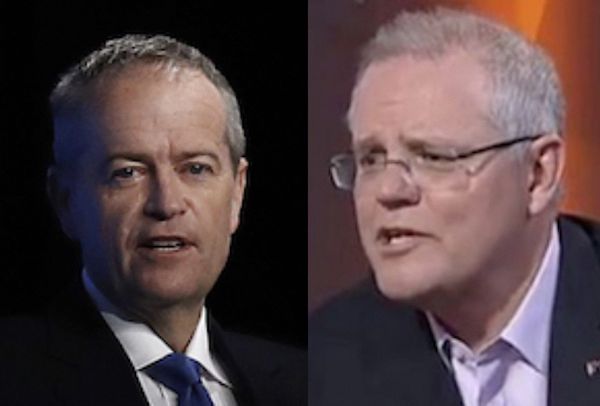Neoliberalism is dead and Labor needs to move convincingly to the Left if it is to provide a real choice for voters, writes Abhranil Hazra.
It's time we stopped believing that the mythical centre exists.
For far too long, the Australian Labor Party, still believing that this is the '80s and '90s, has followed the centrism espoused by the centre unity faction and the formula laid out by Keating and Hawke. These policies which sleep-walked Australia into the neoliberal ticking time bomb it’s in right now, are only a part of the problem, not the solution.
Already on social media, people are calling for a "Quexit" or labelling Australian voters as dumb and mediocre. This seems to have overtones of the 2016 U.S. Election or the UK 2015 Election.
In both these elections, you had a Right-wing candidate against a Centrist candidate. David Cameron’s Conservatives launched a gruelling policy of austerity on the UK, which the United Nations deemed to be inflicting "great misery" on its citizens.
Donald Trump, perhaps the less said, the better. But why did the mainstream, Centre-left Democrats fail to materialise in the U.S. Election? Well, it's simply because the Democrats chose to be "establishment quo" or "conservative-lite".
Opposition Leader Bill Shorten's failure on Saturday was Australia’s Ed Miliband or Hillary Clinton moment — amid an electorate angry with right-wing governments and their gruelling policies of austerity or horrified with the racist rhetoric from Donald Trump. What did Bill Shorten or any of the Centrists offer? Nothing — it's more of the same cosmetics to address inequality. He did not address the fact that the Labor Party voted for the Trans-Pacific Partnership (TPP), did not promise to raise Newstart, failed to focus on how three million Australians live in poverty or the casualisation of our workforce. It failed to capitalise on the anger of the electorate and channel the frustration into votes.
40 per cent of our workforce is part-time or casual. Had the Labor Party proposed to tackle this issue and offer the public concrete policies, people may have taken notice — even people from Queensland. Yes, Queensland.
What if the ALP had said instead, In order to tackle the rampant casualisation in our workforce the Labor Party will propose to scrap the Fair Work Commission or the ABCC to allow unions to collectively bargain to help people have a stable job? What if they had then not backed down when the Liberals and the Murdoch media attacked, but provide reasons like if Australia had collective bargaining, it would lead to a more productive economy?
There are three million Australians living in poverty, but both political parties failed to understand or even try to address the multiple complexities which led to this. Robo-debt payments have also driven people into poverty and this was not addressed. This is a huge percentage of our population, who may have voted en masse for a poverty reduction plan.
The ALP should be creating its own narrative with substantive policy change. It's the reason why support for Bernie Sanders and Jeremy Corbyn grew in spite of the mainstream media predicting the opposite.
Then there's the issue of another prime minister being replaced — some Australians have no idea who the prime minister even is!
Labor's approach has been about consensus and debate — yawn! 31 per cent of Australians rent their homes and the number of Australians owning their own home is slipping. A fully funded public housing policy or proposing a rent-cap to help Australians struggling to pay rent might be a great start in addressing poverty. Sadly, none came from the Labor Party.
On the issue of asylum seekers and Adani, Labor’s decision to remain quiet and play both sides on these issues gave the Coalition the upper hand. The voter thinks: The Labor Party is weak on these issues, perhaps the Coalition is right — maybe the boats are coming; maybe Adani is good for jobs.
And that’s the thing. Not owning your narrative makes a party look weak and timid, which makes an unlosable election possible to lose — just like the UK and USA in 2016 and 2015. Now, some may say, we need to remain right-wing in order to win conservative voters. Well, conservative voters would rather have the real deal. It's like Coke and Coke Zero. If anything it's only going to create a growing right-wing base in support of the Coalition’s narrative.
Many people have blamed anti-Adani campaign as the reason for Labor's demise. Well, the truth is, it's been a largely middle-class campaign led by city residents from Brisbane, Melbourne and Sydney. In order to gain more traction, what should have been discussed is how the mine isn’t going to generate many jobs for rural Queensland, how millions of people’s livelihoods are going to be impacted by the collapse of the tourism industry due to the spills in the Great Barrier Reef. Nor did any party come up with a proper policy to address the deterioration of economic conditions in regional areas.
It's time for Labor to abandon neoliberalism. Campaigning on this ideology is enabling the Right to stay in power. The Right seeks to exploit the sentiment of the masses affected by the economic conditions, through xenophobia and scapegoating. If the Labor Party had rejected neoliberalism and proposed proper structural solutions to address the problems highlighted above, it would be a game changer in Australian politics, just as Corbyn and Sanders are doing now.
Neoliberalism is over. Even the Right recognises this — it's why populist policies opposing foreign corporation ownership have been adopted around the world.
By moving in a progressive direction, Labor would offer a stronger democratic option of a Centre-Left to Left party to the Coalition's Right.
 This work is licensed under a Creative Commons Attribution-NonCommercial-NoDerivs 3.0 Australia License
This work is licensed under a Creative Commons Attribution-NonCommercial-NoDerivs 3.0 Australia License
Support independent journalism Subscribe to IA.










